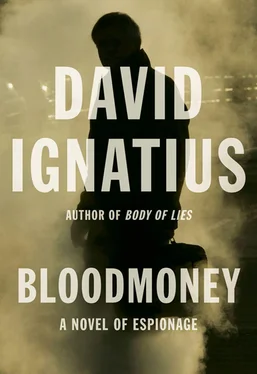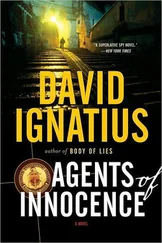David Ignatius - Bloodmoney
Здесь есть возможность читать онлайн «David Ignatius - Bloodmoney» весь текст электронной книги совершенно бесплатно (целиком полную версию без сокращений). В некоторых случаях можно слушать аудио, скачать через торрент в формате fb2 и присутствует краткое содержание. Жанр: Шпионский детектив, на английском языке. Описание произведения, (предисловие) а так же отзывы посетителей доступны на портале библиотеки ЛибКат.
- Название:Bloodmoney
- Автор:
- Жанр:
- Год:неизвестен
- ISBN:нет данных
- Рейтинг книги:4 / 5. Голосов: 1
-
Избранное:Добавить в избранное
- Отзывы:
-
Ваша оценка:
- 80
- 1
- 2
- 3
- 4
- 5
Bloodmoney: краткое содержание, описание и аннотация
Предлагаем к чтению аннотацию, описание, краткое содержание или предисловие (зависит от того, что написал сам автор книги «Bloodmoney»). Если вы не нашли необходимую информацию о книге — напишите в комментариях, мы постараемся отыскать её.
Bloodmoney — читать онлайн бесплатно полную книгу (весь текст) целиком
Ниже представлен текст книги, разбитый по страницам. Система сохранения места последней прочитанной страницы, позволяет с удобством читать онлайн бесплатно книгу «Bloodmoney», без необходимости каждый раз заново искать на чём Вы остановились. Поставьте закладку, и сможете в любой момент перейти на страницу, на которой закончили чтение.
Интервал:
Закладка:
Perkins knew the menu, and he ordered everything he thought she would like: roasted yellow peppers; bruschetta with wild oregano; risotto with white peach; and grilled fishes whose Italian names, spiedino and branzino, made them sound much tastier than monkfish and sea bass. He couldn’t resist ordering another lovely bottle, this one from the Alto Adige. It wasn’t like Sophie to allow herself to be spoiled, but she acceded quite happily in this case, and devoured what was put before her.
“Tell me about Sophie Marx, if that’s permitted,” said Perkins. “I don’t know anything about you, except that you seem awfully good at your job.”
“‘The CIA-we make a world of difference.’ That’s the slogan the recruiters use.”
“And does it? Make a difference, I mean.”
“Enough to keep me interested. I’m sort of an action junkie. And I like keeping secrets. I’ve had lots of practice.”
“You still haven’t told me anything. Where did you grow up? Let’s start there. That’s not classified, is it?”
“In Florida, mostly. And then in St. Croix for a while. And then I ran away from home. Just your normal childhood.”
“I think you’re going to have to explain yourself, madam.”
“I never explain myself.”
But then she did. In the flush of that summer evening, she told him the story that she never told anyone outside work. She trusted him, for reasons she only half understood. She sensed that he was caught, like her, in a world in which he was successful but not entirely happy. He was chasing a glowing filament that receded even as he advanced. Perkins was a good listener, and he let her tell the tale.
“My parents were hippies, sort of,” she began. “They were on the run. I was never sure who from, the cops or the FBI, or just from normal people. And they pulled me along with them. We had a lot of things we couldn’t talk about with anybody. I guess that’s how I got started with the secrecy thing.”
“What was your mother like? She wasn’t a spy, I take it.”
“Do you really want to know? This is private, and it’s sort of embarrassing.”
“Yes, I really want to know. I want to understand what makes a woman turn out like you.”
“My mother was a rebel. She looked like those sixties pictures you see of beautiful girls at Woodstock, or Joni Mitchell album covers. And she was a daredevil. If you told her she couldn’t do something, then she had to do it. Unfortunately, she had a habit of wandering off. I thought she wanted to get away from me and my father, but she said she was just a free spirit. When she was having a good time, she forgot about going home.”
“Would she come back?”
“Usually, but sometimes it took a while. I had to take care of things while she was gone. Cook, and do the shopping, and pay the bills. And take care of my dad when he was blue. I was like Junior Mom. No wonder I’m weird, right?”
“You’re not weird in the slightest. I’m sorry to break that to you. What was he like, your father?”
“He was a dreamer. A romantic, I guess. He was very handsome, sort of impulsive. He did his share of bed-hopping, too. His big problem was that he wasn’t very well organized. He had gotten busted for selling LSD in New York when he was still at Columbia, and then he violated his parole, so we had to move a lot, and sometimes he used false names, and it was a big mess every fall when I had to go to school and we had to fill out all the forms.”
“Where did you live?”
“We started on the Gulf Coast, in Naples, then in Daytona Beach on the Atlantic side, and then in Key West. In the summers I would sometimes go up north to stay with relatives. But the school thing was a problem every September. That’s why we moved to Christiansted in the islands. Some of my parents’ screwy friends were setting up a private school there, so that their children could be freethinkers and not have to study reactionary subjects like spelling and grammar. We lived on a houseboat in Christiansted Harbor. It was the only thing they could afford. I hated it. Every day was like the cast party for Hair .”
“How did you end up so normal, Sophie? I don’t get it. With a childhood like that, you should be in a mental hospital.”
“I have a nonstick coating. What saved me was that I ran away. I knew I couldn’t live like that anymore, and my parents weren’t going to change, so finally I just left. I was fifteen. I had a rich aunt, my father’s sister, who lived in Chicago. She took me in.”
“Is that where the Marx family came from? Chicago?”
“Not exactly. Marx wasn’t our real name. My father changed it to that when he was on the run. The family name was Devereux. My aunt wanted me to change it back when I came to live with her, but I said no. The next year she arranged for me to go to a boarding school in New Hampshire. That’s where I learned how to act normal. But believe me, I’m not.”
“You could have fooled me. From the moment you walked into Edward’s, I thought you were Greta Garbo.”
“I’m a good pretender. That’s one of the survival skills I learned. And having lived that crazy life, I knew things the other kids didn’t, so I was popular. And I did well at Exeter, too. Somehow, all those years of bad schools and listening to my parents’ dopey ideas hadn’t made me stupid. So I was a ‘success.’”
“I still don’t get the CIA part. How did you end up there? With that crazy childhood, I would think you’d want to do something utterly ordinary-work in a bank, or an insurance company.”
Her eyes were alight. She was getting tipsy, on the wine and the company.
“Isn’t it obvious? The CIA was the only place where people understood me. I found a whole government agency full of people who lived on the run, and had secrets they couldn’t tell anyone, and were always pretending. It was a building full of weirdos like me. I told the agency recruiters everything about myself. I had to. It was the first time I had told anyone the whole story. And do you know what? They loved it.”
“Come, now, Miss Devereux. Are you always pretending? Like now, for example.”
“Every minute, and especially now. I’m always afraid someone will expose me as a fraud. I have dreams about it. And my name is Marx.”
Perkins took her hand. It was an unusual thing to do, even in the midst of this intimate conversation.
“You probably won’t believe this, but I have the same anxiety. I think I’m going to be found out. The world I’ve built is going to come crashing down, and I’ll spend the rest of my life trying to pick up the pieces. I’m scared, all the time.”
“You? That’s ridiculous. What do you have to be afraid of?”
“Failure, collapse, bankruptcy. When you’re playing with so much money, it’s easy to get in trouble. That’s why I agreed to help the agency. I tried to explain this to you. At the time we got seriously connected, I was on the ropes. My investors didn’t know it, and the Street didn’t know it. But your friends did. They understood that I was vulnerable. That made me a perfect recruit. Isn’t that what you people say?”
“Yes, that’s what we say.”
She looked at Perkins across the table. He wanted to explain, and she was truly the only one he could tell.
“How did it happen?” she asked. “How did we recruit you?”
So he told her the story. It was a peculiar play, where the audience seemed to understand the story as well as the actor.
“You know Anthony Cronin, the man who introduced us?” he began.
She nodded. Yes, she knew him. That was all she wanted to say, for now.
“I first met Cronin in New York five or six years ago, I can’t remember. That was the easy part, before the squeeze began. The meeting had been arranged by a hedge fund manager I knew. It was obvious that he had intelligence connections but he never explained them.”
Читать дальшеИнтервал:
Закладка:
Похожие книги на «Bloodmoney»
Представляем Вашему вниманию похожие книги на «Bloodmoney» списком для выбора. Мы отобрали схожую по названию и смыслу литературу в надежде предоставить читателям больше вариантов отыскать новые, интересные, ещё непрочитанные произведения.
Обсуждение, отзывы о книге «Bloodmoney» и просто собственные мнения читателей. Оставьте ваши комментарии, напишите, что Вы думаете о произведении, его смысле или главных героях. Укажите что конкретно понравилось, а что нет, и почему Вы так считаете.












